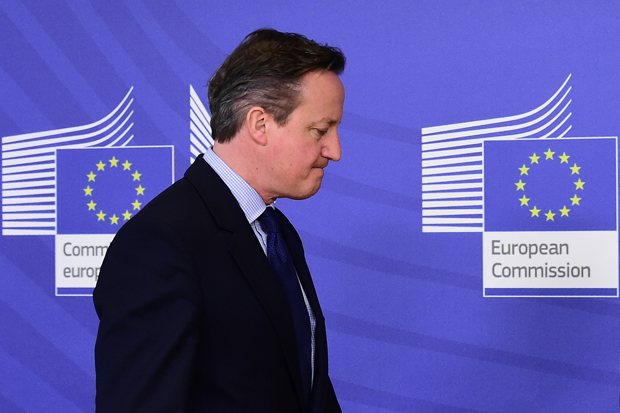Throughout his negotiations with the European Union, David Cameron was fatally undermined by his own lack of resolve. He was never going to recommend an ‘out’ vote in his referendum, as the other leaders knew. He promised a referendum three years ago, not from any great sense of conviction, but as a ploy to stop his party talking about Europe until after a general election which he half-expected to lose. Then, in May last year, he found himself with a majority — and in a position to renegotiate. But not in a position to win, and for a simple -reason: the other side always knew that he’d say yes, no matter what.
Only last year he said that Britain needed a ‘proper, full-on’ change in terms of its engagement with the EU — a noble objective, for which there is much appetite. Britain voted for a free-trade deal in 1975 but ended up being sucked into a quasi-imperial political system. So Cameron’s opportunity was clear: to fight for the deal that Britain voted for first time around, and restore the basic principle that Britain can set its own laws.
It was an achievable ambition. The EU was negotiating from a position of weakness, given that its chaotic system of government incubated a financial crisis and an immigration crisis. Manuel Valls, the prime minister of France, said recently that the European project will ‘die, not in decades or years but very fast’ if the EU does not control the immigration crisis (which it looks unlikely to do). So if Britain were to vote to leave, it would further destabilise an organisation fighting for survival. If they thought Mr Cameron was serious about pulling out, then ‘proper, full-on’ change would have been offered.
Instead, the document this week was 16 pages of bluster and caveat — all of which makes it clear that the power resides in Brussels. This is actually in defiance, rather than support, of Mr Cameron’s stated objectives. When making the case for the referendum, he said he would fight to defend a basic democratic principle: ‘National parliaments are, and will remain, the true source of real democratic legitimacy and accountability.’ The example he chose was a manifesto pledge: the power to reform low-wage subsidies (i.e., tax credits) so they were claimed by British citizens they were intended for, and not by migrant workers for the first four years of their stay.
The Prime Minister claimed victory by saying the four-year period was in the document. He’s right. But on the strict understanding that the European Commission, not the House of Commons, will decide when Britain can impose four-year restrictions on benefits. What’s more, the European Parliament’s 751 members will be given the power to strike down his so-called ‘emergency brake’, or the reduction of child benefits paid overseas. Let us be clear: the draft EU deal is not a repatriation of power. It simply underlines the extent to which power has already been surrendered.
If the Scottish Parliament were told that each of its health and education laws would be subject to a veto by the House of Commons, there would be protest and talk of ‘puppet government’. So the root problem of democratic legitimacy which the Prime Minister so eloquently highlighted when proposing his referendum has not been addressed.
The EU excels at pretending to change. Take its so-called ‘red card’: a pledge to drop draft legislation if 55 per cent of national parliaments object within 12 weeks. Given that any EU legislation needs to be backed by a majority of member governments, this parliamentary veto would require mass rebellion on an impractical scale. As William Hague pointed out, it’s a hurdle so great that ‘even if the European Commission proposed the slaughter of the first-born it would be difficult to achieve such a remarkable conjunction of parliamentary votes’.
Mr Hague said that in 2008. Now there’s a referendum to win, so he has stopped making such points and is now advocating an ‘in’ vote. A depressing trend can now be seen: honest and frank appraisals being -supplanted by spin. When politicians start to talk in insultingly simplistic language, as if trying to win a vote in a caucus of primary-school children, it’s a sure sign that an election campaign has begun.
The situation is made worse by the lack of parliamentary opposition. The Labour party is pro-‘in’. Cabinet members who want to vote ‘out’ have been gagged, and will not be allowed to speak until the formal start of the campaign. Meanwhile the Prime Minister is in full campaign mode, jacket off and hijacking the lunch breaks of factory workers. He is behaving as if he is at last fighting an election campaign that he expects to win.
Mr Cameron may be encouraged by the sorry state of the ‘out’ campaign, described by James Forsyth on page 12. But he ought to be careful: this is not a general election, where one political army fights another. It is quite possible for the ‘out’ side to triumph without much in the way of political leadership. If the electorate feels that its intelligence is being insulted, a rebellion can be raised very quickly. The Prime Minister has two weeks before negotiations are finalised. He would be well advised to stay away from the campaign trail, and use this time to improve the terms of his inadequate deal.
Got something to add? Join the discussion and comment below.
Get 10 issues for just $10
Subscribe to The Spectator Australia today for the next 10 magazine issues, plus full online access, for just $10.
You might disagree with half of it, but you’ll enjoy reading all of it. Try your first month for free, then just $2 a week for the remainder of your first year.














Comments
Don't miss out
Join the conversation with other Spectator Australia readers. Subscribe to leave a comment.
SUBSCRIBEAlready a subscriber? Log in